Key takeaways
- Whole foods enhance meal satisfaction and provide a deeper connection to nutrition, promoting mindfulness in eating.
- Incorporating whole foods into a vegan diet boosts energy levels, improves digestion, and offers abundant nutrients.
- Planning meals by season and focusing on fresh produce streamlines grocery shopping and meal preparation.
- Whole food prep transforms cooking into a creative and meditative practice, contributing to overall well-being.
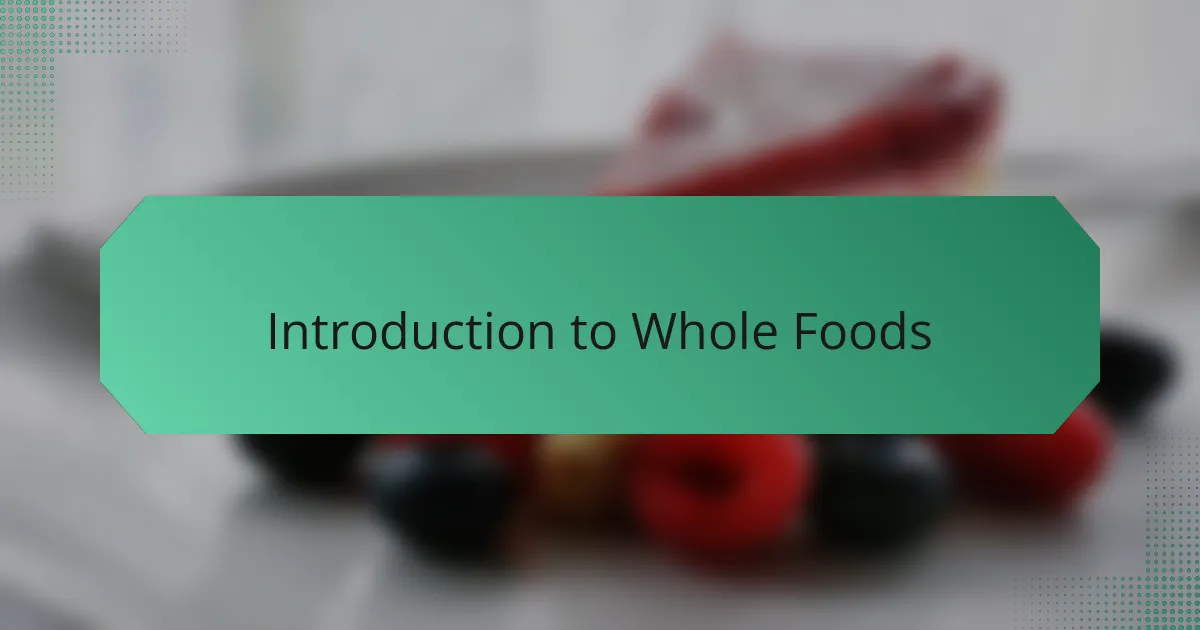
Introduction to Whole Foods
Whole foods, in my experience, are simply foods that are as close to their natural form as possible. No artificial ingredients or heavy processing; just wholesome, nourishing elements from nature. When I first started focusing on whole foods, I noticed how vibrant and satisfying my meals became—they awakened a freshness I hadn’t realized was missing.
Have you ever wondered why eating something fresh just feels different from grabbing a pre-packaged snack? For me, whole foods bring a sense of connection—to the land, the seasons, and even to myself. It’s like each bite carries a story of care and authenticity, something processed foods rarely offer.
Incorporating whole foods wasn’t just about nutrition; it was about embracing simplicity and mindfulness in what I put on my plate. It’s amazing how choosing whole fruits, vegetables, grains, and legumes can transform weekly prep from a chore into a creative, nourishing ritual.
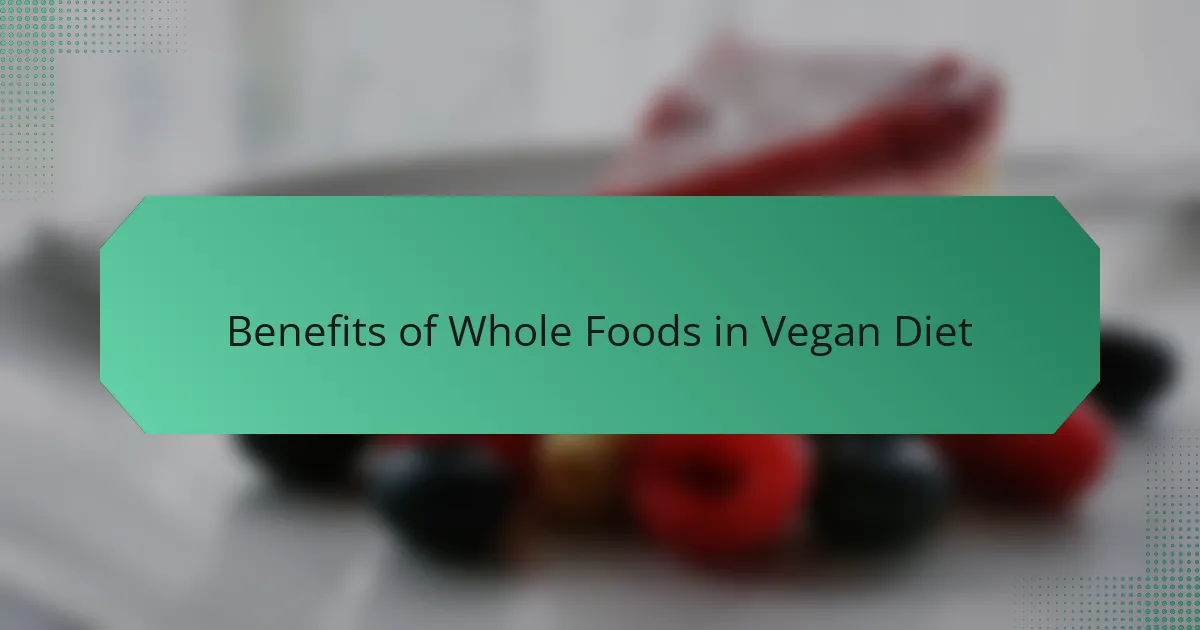
Benefits of Whole Foods in Vegan Diet
One of the biggest benefits I noticed with whole foods in my vegan diet is how much more energized I felt throughout the day. Have you ever experienced that sluggish feeling after a heavy processed meal? Switching to whole foods made a clear difference—I felt lighter, yet fuller, as if my body was truly being nourished rather than just filled.
Another thing that struck me was how whole foods naturally pack a wealth of nutrients—fiber, vitamins, and minerals—that sometimes gets lost in the processing. It’s almost like nature’s own multivitamin, offering everything in perfect harmony. Knowing my meals were rich in these essentials gave me peace of mind, especially as someone relying entirely on plants.
I also found that whole foods helped keep my digestion regular and comfortable. There’s something profoundly satisfying about how simple, natural ingredients can support your gut health without any artificial additives. Have you ever felt uneasy or bloated after a meal? That sensation became rare once I committed to whole foods, turning my weekly prep into a gentle act of self-care.
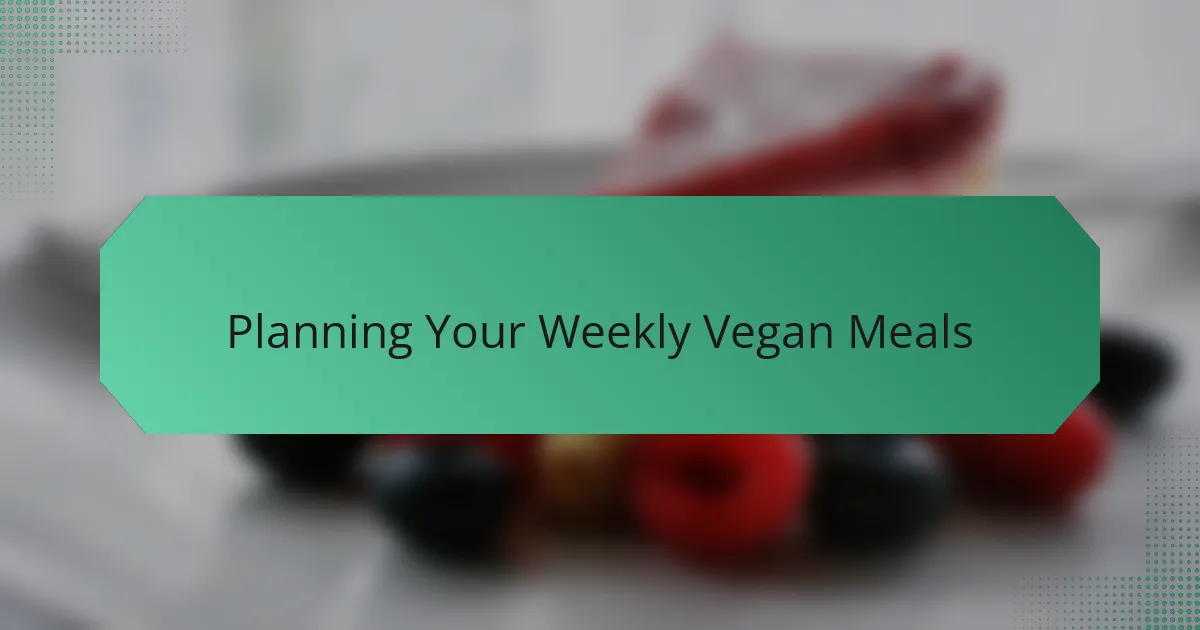
Planning Your Weekly Vegan Meals
Planning my weekly vegan meals used to feel overwhelming until I started approaching it with whole foods in mind. Have you ever tried mapping out your meals by season or focusing on what’s freshest at the market? That little shift made a big difference for me—it brought both structure and excitement to my kitchen routine.
I like to think of my meal plan as a palette of colors and textures, balancing hearty grains, vibrant veggies, and creamy legumes. This approach not only keeps my dishes varied but also ensures I’m covering all my nutritional bases without thinking too hard about it. I’ve found that when I plan this way, grocery shopping becomes quicker and meal prep flows much more smoothly.
Sometimes, I ask myself what I want to feel after eating each meal—energized? Comforted? That mindset helps me tailor my weekly plan to support my goals, whether it’s a protein-rich dinner or a light, detoxifying lunch. Over time, this thoughtful planning has turned into a satisfying ritual rather than a dreaded task.
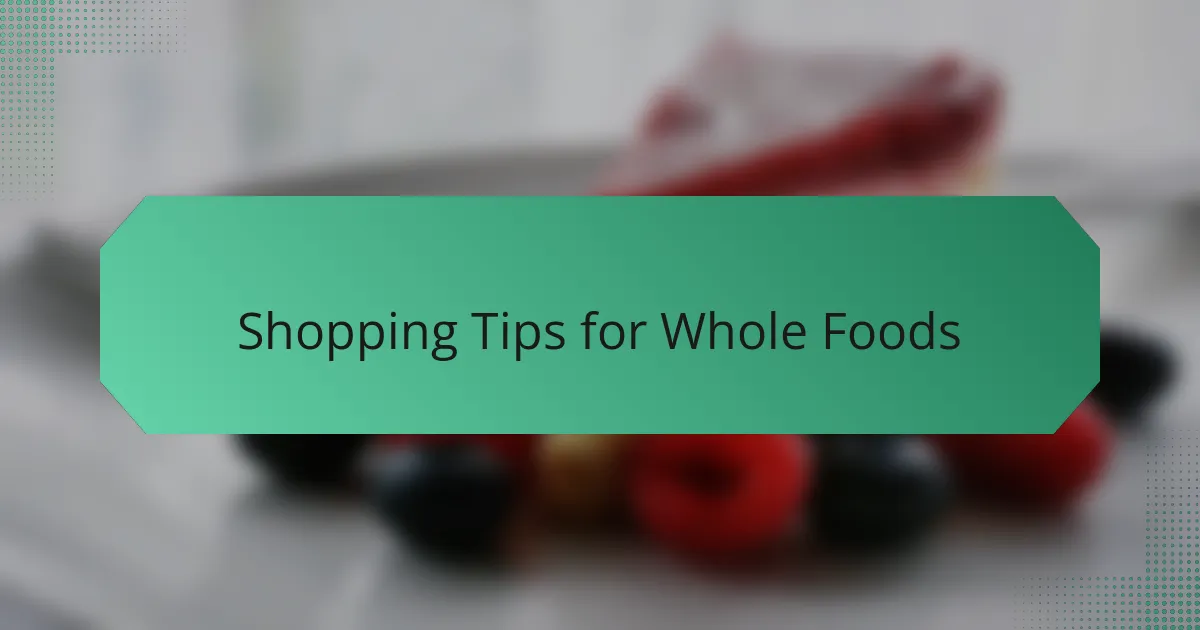
Shopping Tips for Whole Foods
When I first started shopping for whole foods, I learned that going straight to the produce section and picking what looks and feels fresh makes all the difference. Have you noticed how vibrant, firm vegetables and fruits almost invite you to cook them? Trusting your senses helped me avoid less flavorful options and made meal prep more enjoyable.
Another tip that really changed my shopping experience was bringing a list based on my weekly meal plan—it kept me focused and prevented impulse buys. I used to wander aisles aimlessly, but now I find I spend less time and come home with exactly what I need for nourishing, versatile meals. Plus, it feels good knowing I’m being intentional about my choices.
Lastly, I can’t stress enough the importance of shopping seasonally and locally where possible. Have you tried picking up vegetables that are in season? They usually taste better and cost less, which is a win-win. Supporting local markets also deepens my connection to the food’s origins, making the whole prep process feel more meaningful.
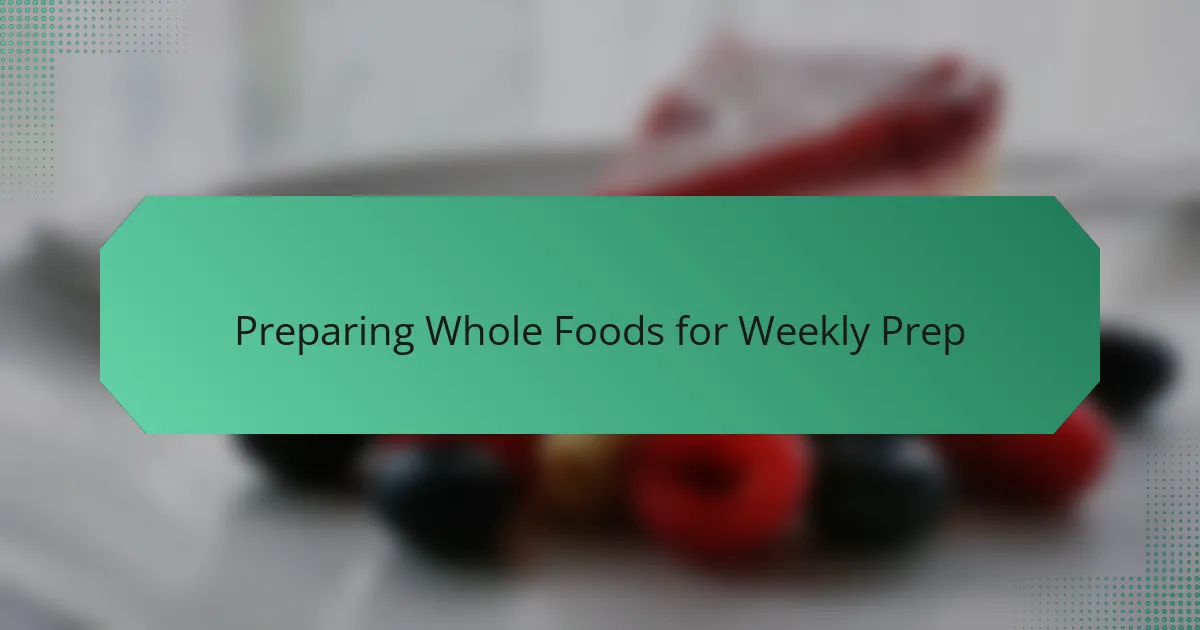
Preparing Whole Foods for Weekly Prep
When I prepare whole foods for my weekly meals, I start by dedicating a good chunk of time to washing, peeling, and chopping everything in one go. Have you ever noticed how much smoother the week goes when your ingredients are ready to use? It turns all those busy evenings into stress-free, quick cooking sessions.
I’ve found that organizing my chopped veggies, grains, and legumes into clear containers makes a huge difference. It’s like having a mini pantry at my fingertips. Plus, seeing the vibrant colors stacked neatly in the fridge motivates me to create more delicious and varied dishes throughout the week.
One thing I’ve come to appreciate is how this initial prep lets me truly savor the process. Instead of rushing each day, I can enjoy assembling meals knowing the hard work is done. Have you tried turning food prep into a mindful ritual? For me, it transforms cooking from a chore into a relaxing, creative moment.
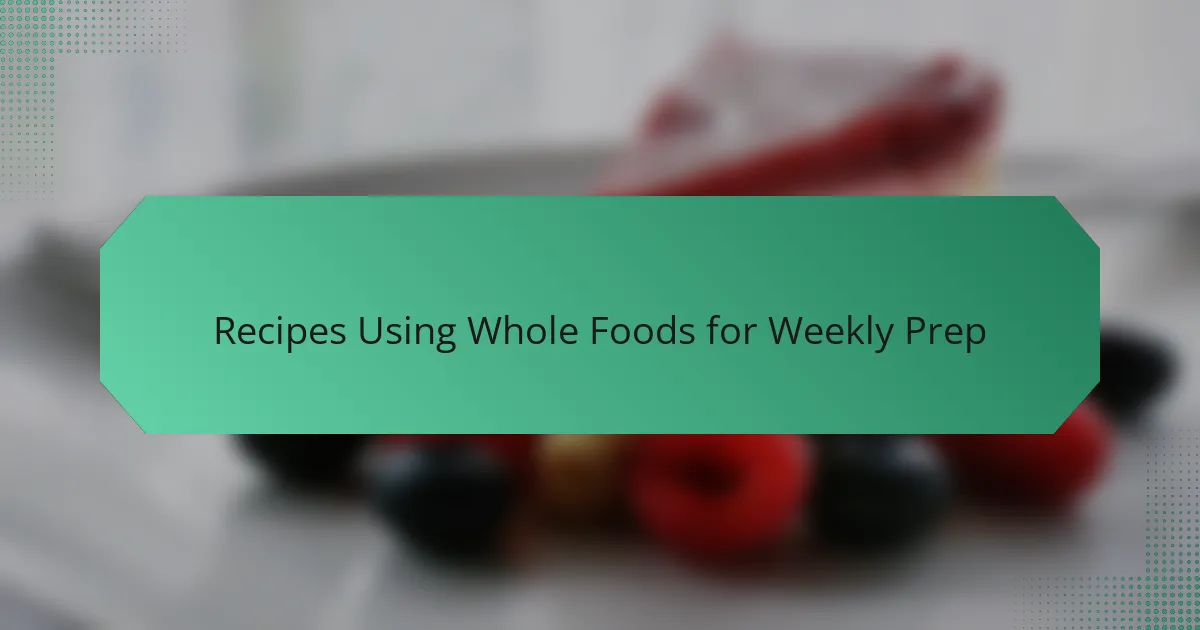
Recipes Using Whole Foods for Weekly Prep
Recipes using whole foods for weekly prep quickly became my go-to because they offer endless versatility without the fuss. For instance, I often whip up a big batch of roasted root vegetables, quinoa, and sautéed greens—all simple ingredients that mix and match beautifully throughout the week. Have you ever found a meal base you can dress up in different ways? That’s the magic here: one prep session, multiple flavorful meals.
What I love most is how these whole food recipes invite creativity while keeping things healthy. One week, I combined roasted sweet potatoes with black beans and avocado for a nourishing bowl; another, I layered cooked millet with steamed broccoli and tahini for a comforting dish. These recipes are not just easy; they’re satisfying in a way that feels both wholesome and indulgent. Don’t you think cooking should be this intuitive and rewarding?
Sometimes I wonder how I ever managed weekly meals without relying on whole foods. The natural textures and flavors create dishes that don’t need heavy sauces or complicated seasoning to shine. Just a sprinkle of fresh herbs or a splash of lemon can elevate the simplest ingredients. Have you noticed how something so straightforward can taste so rich and fulfilling? It’s a real game-changer for meal prepping.
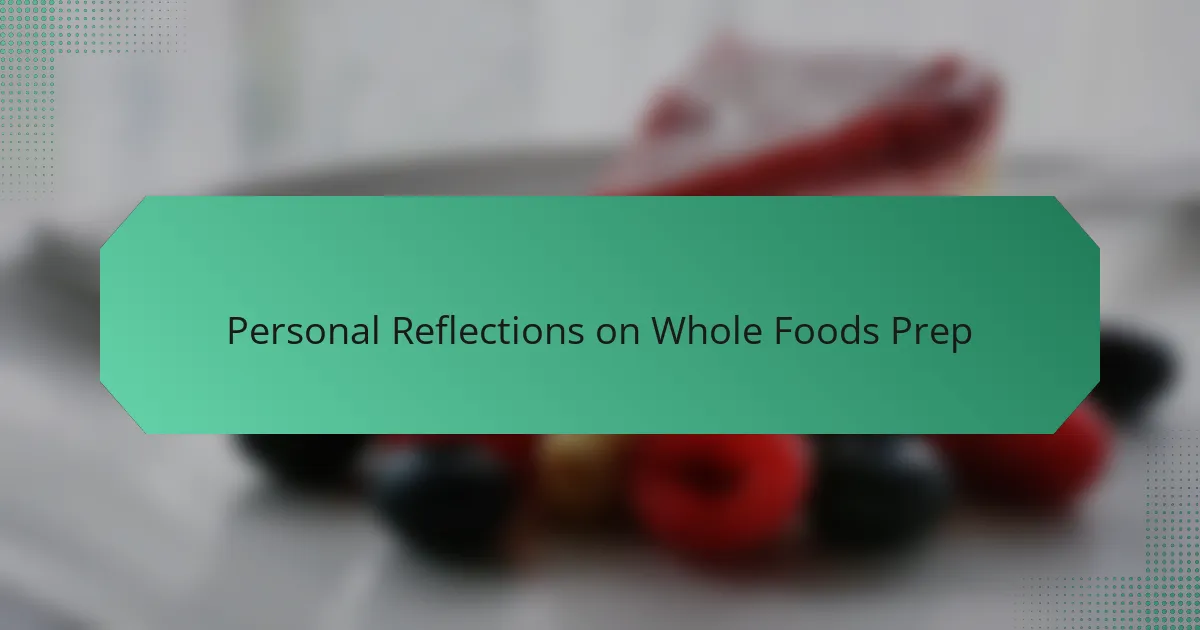
Personal Reflections on Whole Foods Prep
Reflecting on my weekly whole foods prep, I realize how much it has shifted not just my eating habits but my entire mindset around food. There’s a quiet satisfaction in knowing that every chopped carrot or rinsed grain is a step toward nourishing myself with intention. Have you ever felt that gentle pride after completing a prep session? For me, it’s a small victory that sets a positive tone for the week.
Sometimes, I catch myself appreciating the simplicity of whole foods prep—the rhythm of washing, slicing, and storing feels surprisingly meditative. It’s like a moment carved out just for me, away from the rush. This practice has taught me patience and presence in the kitchen, making the whole process feel less like a task and more like a form of self-care.
Of course, there are days when prep feels overwhelming, and I question if it’s worth the effort. But those moments quickly pass when I see how much easier meals come together and how energized I feel. Doesn’t that payoff make the upfront work feel like a meaningful investment? In my experience, whole foods prep is truly a gift I give myself each week.